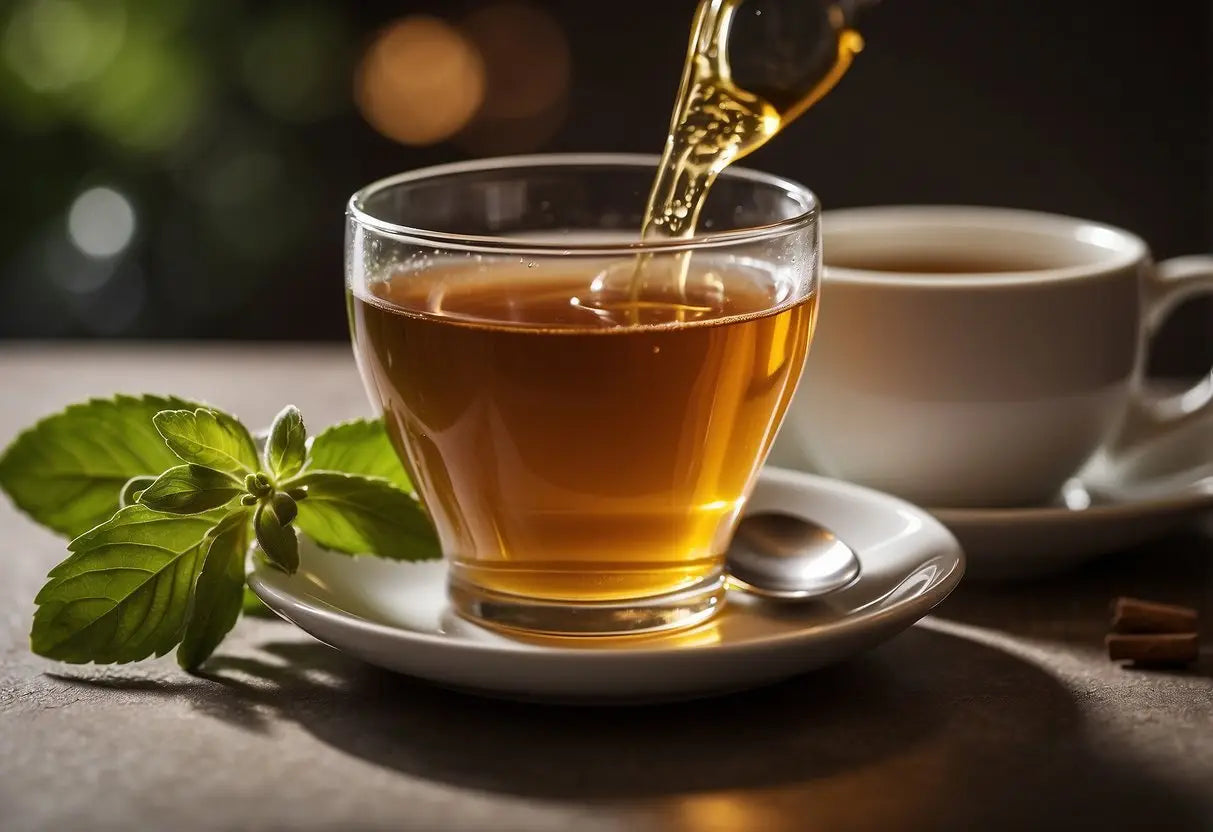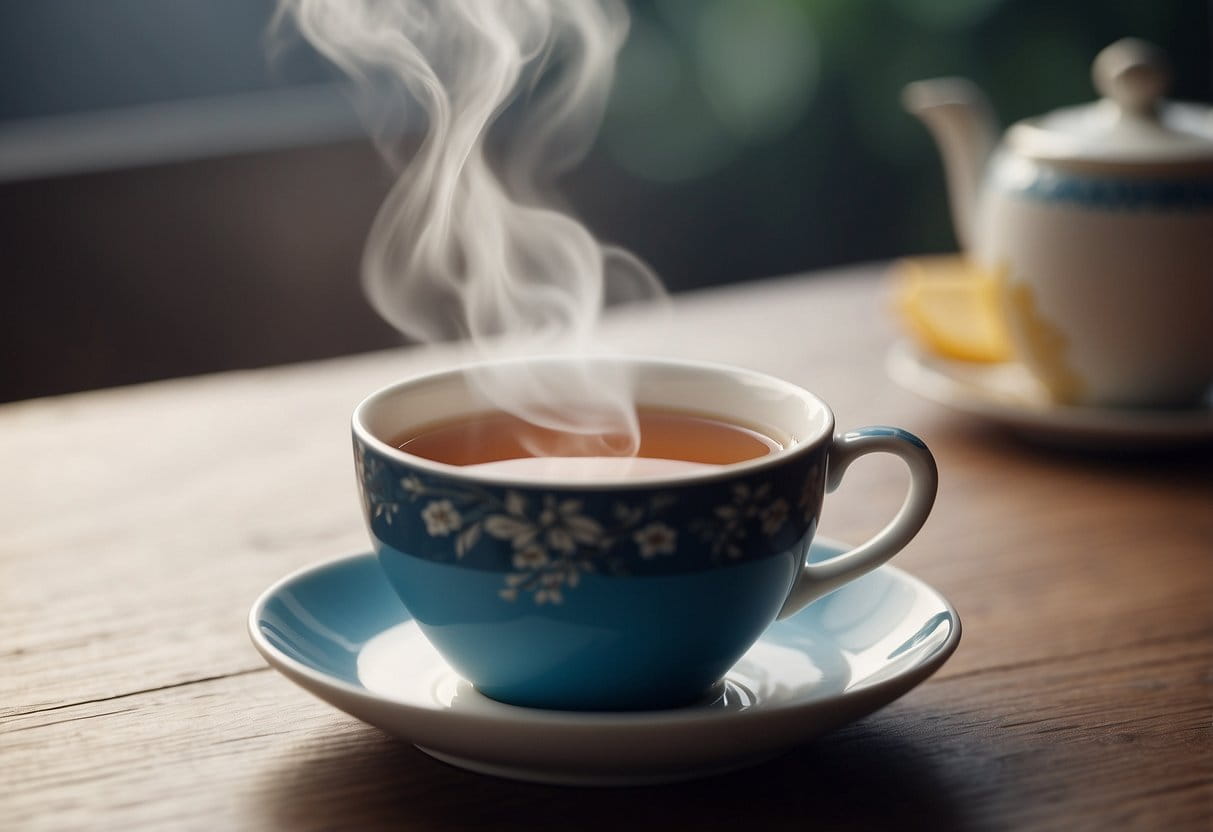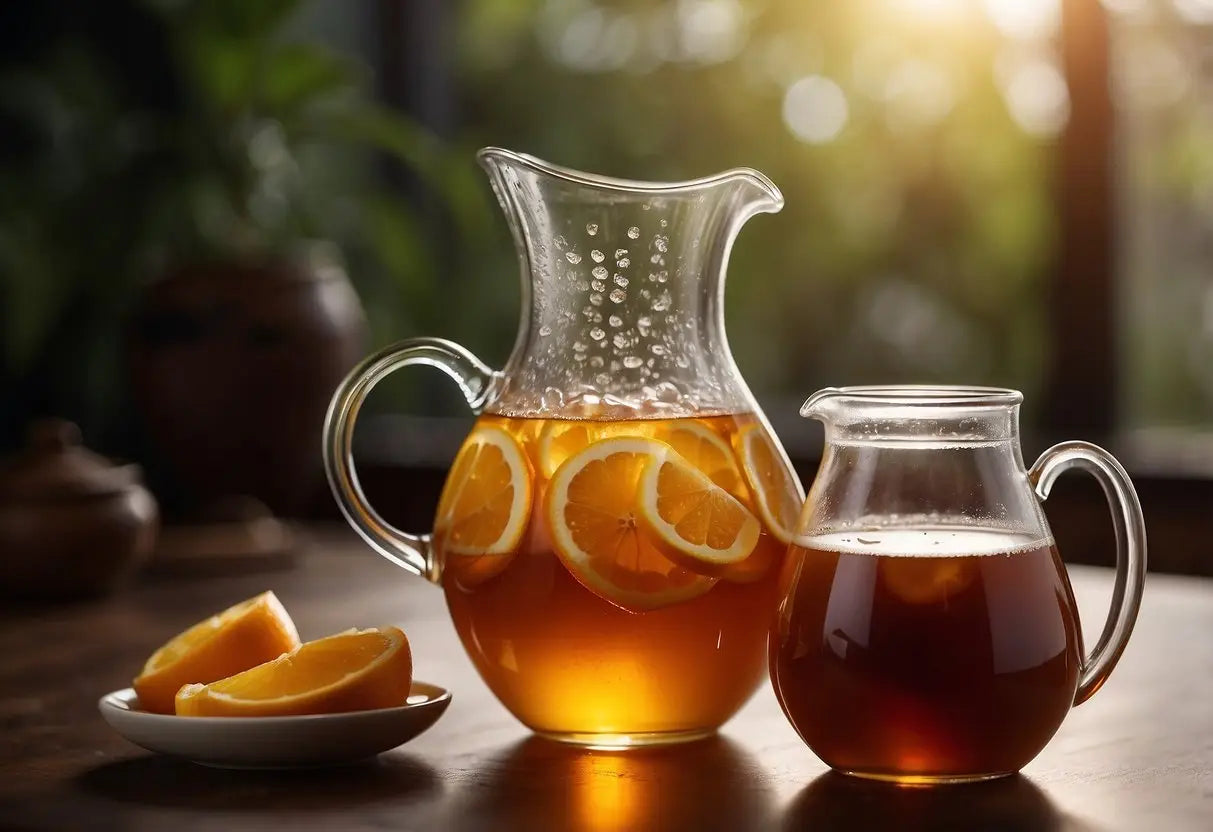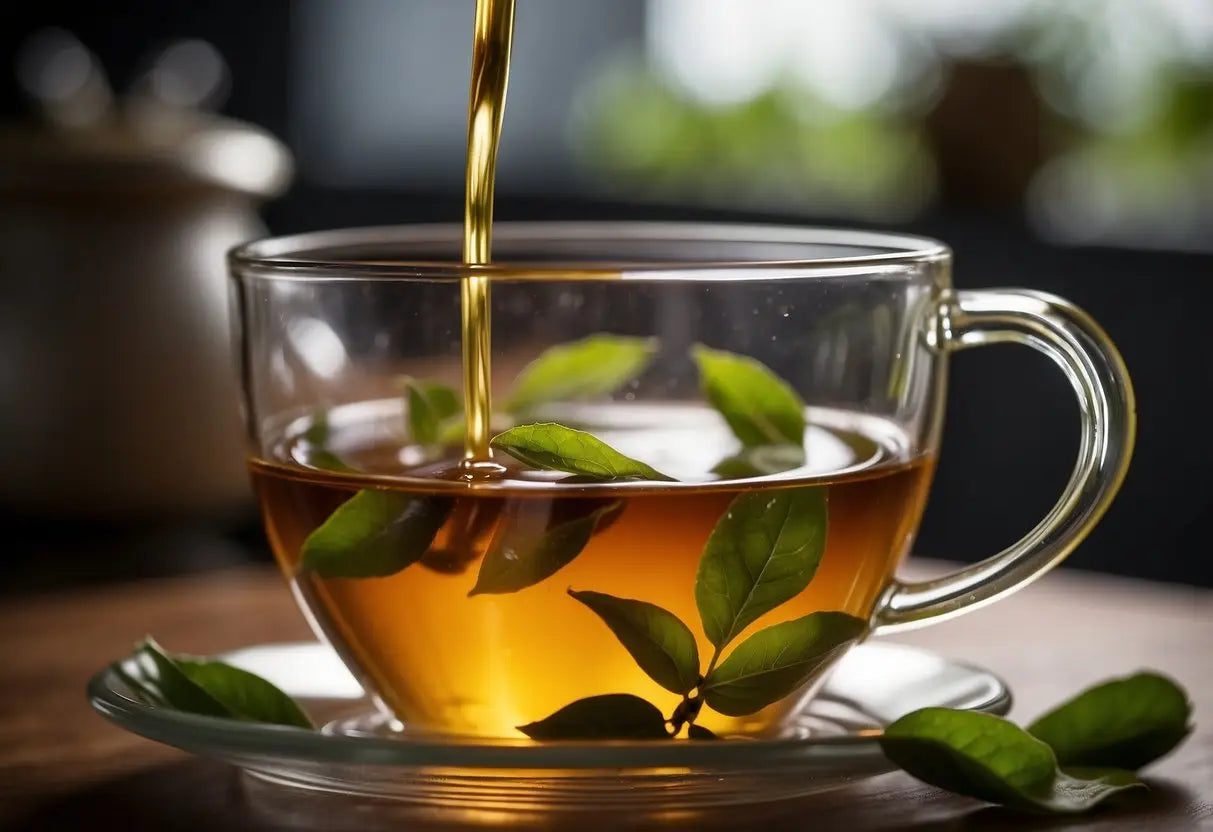How to Sweeten Tea Without Sugar
When it comes to sweetening tea without sugar, you have a variety of alternatives. These sweeteners can be natural or artificial, each with its benefits.
Natural Sweeteners:
- Honey: Adds a rich, floral sweetness.
- Maple Syrup: Provides a unique, earthy flavor.
- Stevia: A plant-based, calorie-free sweetener.
Artificial Sweeteners:
Bestsellers
- Aspartame: Low-calorie, commonly found in diet drinks.
- Sucralose: More commonly known as Splenda, it’s high in sweetness.
- Saccharin: One of the first artificial sweeteners, often used in processed foods.
Sweetness Comparison Table
| Sweetener | Sweetness Level | Calories per Teaspoon |
|---|---|---|
| Honey | Moderate | 21 |
| Maple Syrup | Slightly less sweet | 17 |
| Stevia | Very Sweet | 0 |
| Aspartame | Very Sweet | 0 |
| Sucralose | Extremely Sweet | 0 |
| Saccharin | Very Sweet | 0 |
Selecting the right sweetener depends on your taste preferences and dietary needs. Natural options often offer additional nutrients, while artificial sweeteners provide sweetness without the calories.
Natural Sweeteners

Natural sweeteners offer ways to enhance the flavor of your tea with ingredients like honey, stevia, maple syrup, and agave nectar.
Honey
Honey is a popular choice due to its rich flavor and natural origins. It contains antioxidants, vitamins, and minerals which can provide health benefits.
Usage: Add a teaspoon to your hot tea and stir until dissolved. For iced tea, dissolve honey in a small amount of hot water before mixing it in. Honey's floral notes can complement both herbal and black teas.
Considerations: Honey is high in calories and should be used in moderation if you are watching your calorie intake or have dietary restrictions.
Stevia
Stevia is a zero-calorie sweetener derived from the leaves of the Stevia rebaudiana plant. It is much sweeter than sugar, so a small amount goes a long way.
Usage: A few drops of liquid stevia or a pinch of stevia powder can sweeten your tea without adding any calories. It works well in both hot and cold teas.
Considerations: Stevia can have a slightly bitter aftertaste for some people, and its sweetness may differ between brands, so you might need to experiment to find the best fit for your tastes.
Maple Syrup
Maple syrup is a natural sweetener with a distinctive, robust flavor. It contains vitamins and minerals such as manganese and zinc.
Usage: Stir in a teaspoon of maple syrup to hot tea until fully mixed. For cold tea, dissolve it in a bit of hot water first. Maple syrup pairs well with black and green teas, adding a unique depth to the flavor profile.
Considerations: Maple syrup is also high in calories, so use it sparingly if you are mindful of your sugar intake.
Lao Ban Zhang
Agave Nectar
Agave nectar is a sweetener derived from the agave plant. It has a mild taste and dissolves easily in both hot and cold beverages.
Usage: Mix in a teaspoon of agave nectar to achieve the desired sweetness. It blends well with various teas, making it a versatile choice.
Considerations: Agave nectar has a higher fructose content, which can affect your blood sugar levels. It's important to use it in moderation, especially if you have diabetes or other health concerns related to sugar consumption.
Artificial Sweeteners

Artificial sweeteners offer a way to sweeten tea without sugar. They vary in sweetness levels and are often low or zero-calorie options. Below, learn about some common artificial sweeteners and how to use them effectively.
Sucralose
Sucralose is widely known under the brand name Splenda. It is about 600 times sweeter than sugar, making it very potent. Sucralose is stable under heat, which means you can use it in hot tea without losing its sweetness.
Unlike some other sweeteners, sucralose has a profile that closely mimics that of sugar, with minimal aftertaste. This makes it a popular choice for those who want to avoid sugar but still enjoy the sweet flavor they are accustomed to. It's also available in granular form, making it easy to measure and mix in your tea.
Aspartame
Aspartame, marketed under brands like Equal and NutraSweet, is about 200 times sweeter than sugar. It provides a clean, sweet taste and is commonly found in various diet beverages and food products. While effective in cold beverages, it is less stable in high heat.
This sweetener is best added to your tea after brewing, to avoid potential degradation. Some people may notice a slight aftertaste, though this varies from person to person. Aspartame is a good choice if you want a low-calorie sweetener with a flavor profile that closely resembles sugar.
Saccharin
Saccharin is one of the oldest artificial sweeteners and is known by brand names such as Sweet'N Low. It is 300 to 400 times sweeter than sugar. Saccharin has a strong sweetness and is highly stable, making it suitable for both hot and cold teas.
Some individuals detect a metallic or bitter aftertaste with saccharin, but many formulations have improved to reduce this. It is a cost-effective option and can be found in both tablet and powder form. Saccharin is particularly useful if you need a robust sweetener for your tea with long shelf life.
Sugar Alcohols
Sugar alcohols offer a sweet taste with fewer calories than sugar. They can be a good alternative for those who want to avoid sugar without compromising on taste.
Xylitol
Xylitol is a popular sugar alcohol used as a sweetener. It has a sweetness similar to sugar but with fewer calories.
It is often found in chewing gum and oral care products because it doesn't contribute to tooth decay. In fact, it may even help reduce the risk of cavities.
When using xylitol in tea, start with a small amount and adjust to taste. Be mindful of its digestive effects, as consuming large amounts can lead to bloating or discomfort.
Erythritol
Erythritol is another sugar alcohol that is often used as a sweetener. It has about 60-70% of the sweetness of sugar and contains very few calories.
Unlike some other sugar alcohols, erythritol has minimal digestive side effects. This makes it a good option for people who are sensitive to sugar alcohols.
You can add erythritol directly to your tea. It dissolves easily and does not leave an aftertaste. It is also available in granulated and powdered forms, making it versatile for different types of beverages.
Fruit Juice Concentrates

Fruit juice concentrates are an effective way to sweeten your tea. They add natural sweetness and a hint of fruit flavor without the need for refined sugar.
Examples of Fruit Juice Concentrates:
- Apple juice concentrate
- Orange juice concentrate
- Grape juice concentrate
- Pomegranate juice concentrate
Benefits of Using Fruit Juice Concentrates:
- Adds natural sweetness
- Contains vitamins and minerals
- Can enhance the flavor profile of your tea
How to Use:
- Brew your tea as usual.
- Add a small amount of fruit juice concentrate, starting with 1-2 teaspoons.
- Stir well and taste. Adjust the amount based on your preference.
Tips:
- Cold Tea: Fruit juice concentrates work well in both hot and cold teas.
- Combinations: Mix different concentrates to create unique flavors.
- Adjustments: Always start with a small amount; you can add more if needed.
Fruit juice concentrates can be found in many grocery stores, typically in the frozen section or near the juice aisle. Look for options without added sugars or artificial ingredients.
Adding Flavor without Sweetness
Transform your tea by enhancing its flavor with natural ingredients like lemon juice, mint, and cinnamon. These additions provide a refreshing and aromatic experience without adding any sweetness.
Lemon Juice
Lemon juice adds a citrusy tang to your tea, elevating its crispness. Squeeze half a lemon directly into your cup. The acidity from the lemon balances the bitterness of black or green teas, adding a refreshing burst of flavor.
Adding lemon juice also brings out the flavors in herbal teas. Rich in vitamin C and antioxidants, it can be a healthy addition to your daily routine.
Mint
Mint introduces a cooling sensation to your tea with its invigorating aroma. Fresh mint leaves work best—simply crush a few leaves between your fingers to release the oils, then add them to your cup.
Mint pairs well with green, black, and herbal teas, providing a refreshing taste. This addition can also aid in digestion and freshen your breath, making it a multifunctional ingredient.
Cinnamon
Cinnamon adds warmth and complexity to your tea. A cinnamon stick steeped in hot water or a sprinkle of ground cinnamon can transform a simple cup of tea into a fragrant, spicy treat.
This spice works wonderfully with black and rooibos teas. Besides its flavor appeal, cinnamon is known for its anti-inflammatory properties and can help regulate blood sugar levels.
Brewing Techniques to Enhance Natural Sweetness

Choosing the right tea leaves plays a key role. Opt for high-quality loose leaf teas, such as Assam, Jasmine, or Oolong. These often have natural sweetness.
Water temperature matters. For green and white teas, keep the water between 160°F and 185°F. For black and herbal teas, use boiling water.
Steeping time affects flavor. Green teas require 2-3 minutes, while black teas need 3-5 minutes. Herbal teas might need 5-7 minutes. Oversteeping leads to bitterness.
Consider using filtered water. Impurities in tap water can alter the tea's natural taste.
Add fruits or herbs. Infusing your tea with citrus, berries, or mint enhances its sweetness.
Try a pinch of baking soda. Adding a small amount can reduce the tea's bitterness.
Experiment with different blends. Combining teas like Earl Grey with floral notes can result in a sweeter brew.
Brewing double strength and then diluting with cold water can bring out more sweetness in iced teas.
Use a French press. This method evenly distributes flavors, enhancing the sweetness.
Store your tea properly. Keep it in a cool, dry place away from light and moisture to preserve its natural flavors.
Remember that patience and experimentation are key. Adjust brewing methods to fit your taste preferences.
Health Considerations
When you avoid sugar, you reduce the risk of obesity and type 2 diabetes. High sugar intake can lead to insulin resistance and weight gain.
Consider your teeth. Sugar substitutes like stevia or xylitol do not contribute to tooth decay. This can lead to better dental health in the long run.
Artificial sweeteners, such as aspartame, may have side effects for some people. It's best to monitor how your body responds and consult a healthcare professional if needed.
Natural alternatives, like honey, have antioxidants but are still high in calories. Use them sparingly to avoid potential weight gain.
Table: Comparison of Sweeteners
| Type | Calories | Effects on Health |
|---|---|---|
| Stevia | 0 | No impact on blood sugar |
| Xylitol | 2.4 per g | Good for teeth |
| Honey | 64 per tbsp | High in antioxidants, but high in calories |
| Aspartame | 0 | Can have side effects |
Be cautious with honey if you have allergies. Honey can cause reactions in some individuals with sensitivities to pollen.
Diabetics need to be particularly careful with sweeteners that affect blood sugar. Opt for sweeteners with a low glycemic index.
Natural sweeteners like agave nectar still contain sugars but at a lower glycemic index than sugar. Nonetheless, they should be consumed in moderation to avoid adverse health effects.
← Older post Newer post →











